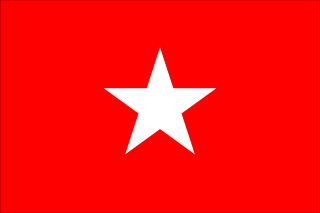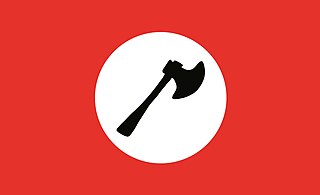Related Research Articles

Jamaat-e-Islami (JI),, or simply known as Jamaat, is an Islamic political party based in Pakistan and the Pakistani successor to Jamaat-e-Islami, which was founded in colonial India in 1941. Its objective is the transformation of Pakistan into an Islamic state, governed by Sharia law, through a gradual legal, and political process. JI strongly opposes capitalism, communism, liberalism, socialism and secularism as well as economic practices such as offering bank interest. JI is a vanguard party: its members form an elite with "affiliates" and then "sympathizers" beneath them. The party leader is called an ameer. Although it does not have a large popular following, the party is quite influential and considered one of the major Islamic movements in Pakistan, along with Deobandi and Barelvi.

The Muttahida Qaumi Movement (MQM), previously known as Muhajir Qaumi Movement, is a secular political party in Pakistan that was founded by Altaf Hussain in 1984. Currently the party is split between 2 main factions. MQM-London faction is controlled by Altaf Hussain from London, while MQM-Pakistan is run by Khalid Maqbool Siddiqui based in Pakistan. Its electoral symbol is a kite.
Altaf Hussain is a British Pakistani fugitive and former politician who is known as the founder of Muttahida Qaumi Movement.

The Communist (Maoist) Party of Afghanistan previously known as Communist Party of Afghanistan is an underground Maoist political party in Afghanistan. The party was founded in 2004 through the merger of five Marxist–Leninist–Maoist (MLM) parties. It was a member of the international Revolutionary Internationalist Movement (RIM).
Qazi Hussain Ahmad was an Islamic scholar, democracy activist, and former Emir of Jamaat-e-Islami, the socially conservative Islamist political party in Pakistan.
The National Students Federation Pakistan (NSF) is a left-wing student federation in Pakistan. In the late 1960s, NSF adopted the political ideologies of Marxism–Leninism and Mao Zedong Thought.
Democratic Students Federation (DSF) is a left-wing student organization in Pakistan. It was first established on 13 January 1951 in Karachi by students of the Dow Medical College, led by Mohammad Sarwar and including MRA Hashmi, Asif Jaffery, Asif Hameedi, Yousuf Ali and S Haroon Ahmed, as the organization that previously dominated campuses, the Muslim Students Federation, began to wither. From its inception, it was close to the Communist Party of Pakistan (CPP), and therefore banned along with the CPP in 1954. Its members, however, managed to infiltrate other student organizations, notably the National Students Federation founded in 1958.

ISLAMIA SCIENCE COLLEGE KARACHI is located in Karachi, Sindh, Pakistan. It is one of the largest colleges in Pakistan. The college provides faculties of Science, Law, Commerce and Arts. It is located just opposite Dawood College of Engineering and Technology. Islamia Science College, Islamia Law College, Islamia Commerce and Arts College are in one complex which was founded by Late Abdul Rehman Muhammad Qureshi. The college was inaugurated by President Ayub Khan in August 1961.

The All Pakistan Muttahida Students Organization Urdu: (آل پاکستان متحدہ اسٹوڈنٹس آرگنائزیشن) (APMSO) is notable for being the student organization that created a political party in Pakistan, the Mohajir Quami Movement, now called the Muttahida Qaumi Movement (MQM).
Allama Hassan Turabi was a Pakistani and prominent Shia Muslim cleric, chief of the main Shiite political party, Tehrik-e-Jafaria Pakistan. He was assassinated by a Sunni Bangladeshi on 14 July 2006 following his return from an anti-Israel protest regarding the 2006 Lebanon War.

Metroville is a neighborhood in the Karachi West district of Karachi, Pakistan. It was previously administered as part of the SITE Town borough, which was disbanded in 2011.

The Mazdoor Kisan Party (MKP) is a political party in Pakistan with communist and socialist leanings. In the 1970s, it led a militant communist movement in Hashtnagar, Charsadda District, Pakistan. In 2012, a documentary film was screened in Lahore highlighting the armed struggle of peasants and workers of this small area which was crushed in 1974 by the Zulfikar Ali Bhutto regime.
The Baloch Students Organization is a student organisation that campaigns for the students of Pakistan's Balochistan Province. It was founded as a student movement on 26 November 1967 in Karachi and remains the largest ethnic Baloch student body in the country. It got divided due to ideological differences. BSO Pajjar and BSO Mengal affiliated itself with the parliamentary framework of Pakistan. Dr Allah Nazar, founder of pro independence wing, In 2002 while he was studying in college, he created a breakaway faction — BSO–Azad — that advocated struggle for an independent Balochistan based on pre-colonial Baloch country. The Pakistani government banned the BSO Azad on 15 March 2013, as a terrorist organisation.
The Mohajir Qaumi Movement (Haqiqi), whose leader is Afaq Ahmed, is a political party claiming to represent the Mohajir in Sindh, Pakistan. The Movement was originally established by Altaf Hussain in 1978 as All Pakistan Mohajir Students Organization (APMSO), in Karachi University. Presently, the movement is known as "Haqiqi", a break away faction of the original Mohajir Qaumi Movement (which was later renamed the "Muttahida Qaumi Movement", headed by Altaf Hussain, who is living in self-exile in London.

Majlis Wahdat-e-Muslimeen Pakistan (MWM) is a Pakistani Shiite political organization. Its headquarters are in Islamabad. MWM Pakistan works to establish an Islamic democratic welfare state, particularly emphasising Shiite-Sunni unity.

Anjuman Talaba-e-Islam is a student organization related to the Barelvi school of thought made to promote Ishq e Rasool & to protect the rights of the students of Barelvi community. Anjuman Talaba e Islam was founded on 20 January 1968 with respect to 20th Shawwal 1387 A.H in Karachi, Pakistan, by a group of students including Haji Muhammad Yaqoob Qadri along with some of their fellow students.
Islami Jamiat-e-Talaba Pakistan is the student organisation of the Jamaat-e-Islami Pakistan. It was founded by 25 students on 23 December 1947 at Lahore, Pakistan on the advice of Maulana Naeem Siddiqui. Islami Jamiat-e-Talaba Pakistan is working in Pakistan to eliminate the non-Islamic elements and secularism from the curriculum and teachings of the educational institutions of Pakistan.

The Jeay Sindh Students’ Federation Sindhi: abbreviated as JSSF, is the student wing of various separatist organizations struggling for the freedom of Sindhudesh following the ideology of G. M. Syed, founded in 1969. JSSF was a nationalist outfit which emerged from Anti-Unitary System Struggle in the late 1960s and later joined G. M. Syed in his ideology of a separate homeland for Sindhis in 1972. Since then, it has been working as the students’ front of the Jeay Sindh or Sindhudesh movement.
References
- ↑ Saeed Shah (November 20, 2009).British Council: Pakistan facing 'frightening' demographic disaster.The Telegraph. Accessed 2013-4-18
- ↑ Population Division of the Department of Economic and Social Affairs of the United Nations Secretariat, World Population Prospects: The 2010 Revision Archived 2011-05-06 at the Wayback Machine
- ↑ Michael Kugelman (January 2012). Prospects for youth-led movements for political change in Pakistan Archived 2013-11-11 at the Wayback Machine Norwegian Peacebuilding Resource Center
- ↑ Hasnain Kazim (January 15, 2013). Unrest and Political Uncertainty: Pakistan Tumbles into Chaos Spiegel Online International, Accessed 2013-4-22
- 1 2 Nadeem F. Paracha. Student politics in Pakistan: A celebration, lament and history Archived 2013-04-09 at the Wayback Machine The Nadeem F. Paracha Works Archive
- 1 2 Beena Sarwar, (August 22, 2011). Aur Nikle.nge Ushhaq ke Qafley - a documentary film on DSF (1949-54) 30 min (2010)
- ↑ Islami Jamiat-e-Talaba Pakistan
- ↑ Fawad Hasan, (January 2, 2013). Students Demands Day: the struggle continues [ permanent dead link ]PUBLICi Accessed 2012-4-22
- ↑ Jayatsen Bhattacharya, (October 17, 2012). A catch he can't miss Archived 2012-10-22 at the Wayback Machine HindustanTimes Accessed 2013-4-22
- ↑ Teach For Pakistan- Start the Movement
- 1 2 3 Moeed Yusuf, (October 2008),ProsPects of Youth Radicalization in Pakistan: Implications for U.S. Policy Archived 2013-09-05 at the Wayback Machine The Brookings Project on U.S. Relations With the Islamic World
- ↑ Unemployment in Pakistan (Case Study)
- ↑ Muhammad Naveed, (March 21, 2013). Unemployment In Pakistan Archived 2013-06-14 at the Wayback Machine FM Urdu Accessed 2013-4-22
- 1 2 Daily Times Pakistan Accessed 2013-4-15
- ↑ Pakistan Denmark Prophet Drawings
- 1 2 Amir Rana and Waqar Gillani (November 24, 2003). Iran not funding ISO: Shirazi. DailyTimes.com. Accessed 2007-09-10.
- ↑ Imamia Students Organization Archived 2008-03-08 at the Wayback Machine . ISOPakistan.net. Accessed 2008-05-09.
- ↑ Muslim Student Federation Formation of Muslim Student Federation Archived 2013-04-06 at the Wayback Machine
- ↑ Muslim Student Federation (N)Central Leadership Archived 2013-04-06 at the Wayback Machine
- ↑ Owais Jafri (November 25, 2013).Mumtaz Hussain Bhatti was famous student leader of the federation.He was President of Punjab during Ghulam Haider Wyne period in Punjab Campus violence: Three critical after students’ clash The Express Tribune Accessed 2013-4-22
- ↑ Muslim Student Federation • Chichawatni Pakistan
- 1 2 3 4 Nadeem F. Paracha (February 10, 2008).Student politics: a brief history Dawn.com Accessed 2013-4-22
- ↑ NSF's Website
- ↑ The Directorate of Press of Pakistan Peoples Party
- ↑ Pakistan Elections 2013 Reference Page
- ↑ "Muttahida Qaumi Movement". Pakistan Zindabad. Retrieved 10 July 2012.
- ↑ Moonis Ahmar (October 1996).Ethnicity and State Power in Pakistan: The Karachi Crisis Asian Survey Vol. 36, No. 10
- 1 2 Pakistan Youth Movement - Vision-brandsynario
- ↑ PYM's Website
- ↑ PYC's Website - Vision
- ↑ PYC's Website - Mainpage
- ↑ YPP's Website - About
- ↑ Youth Action for Democracy
- ↑